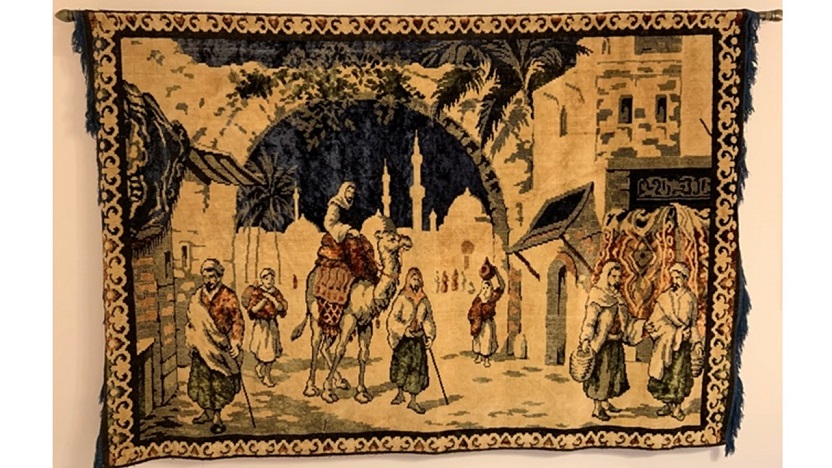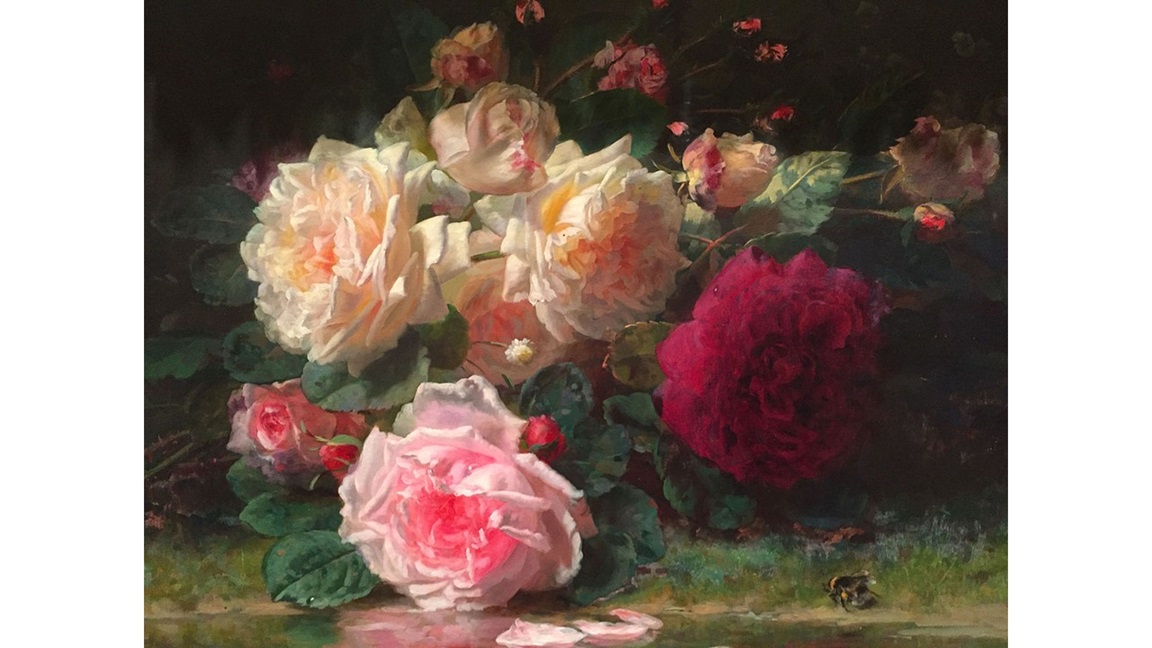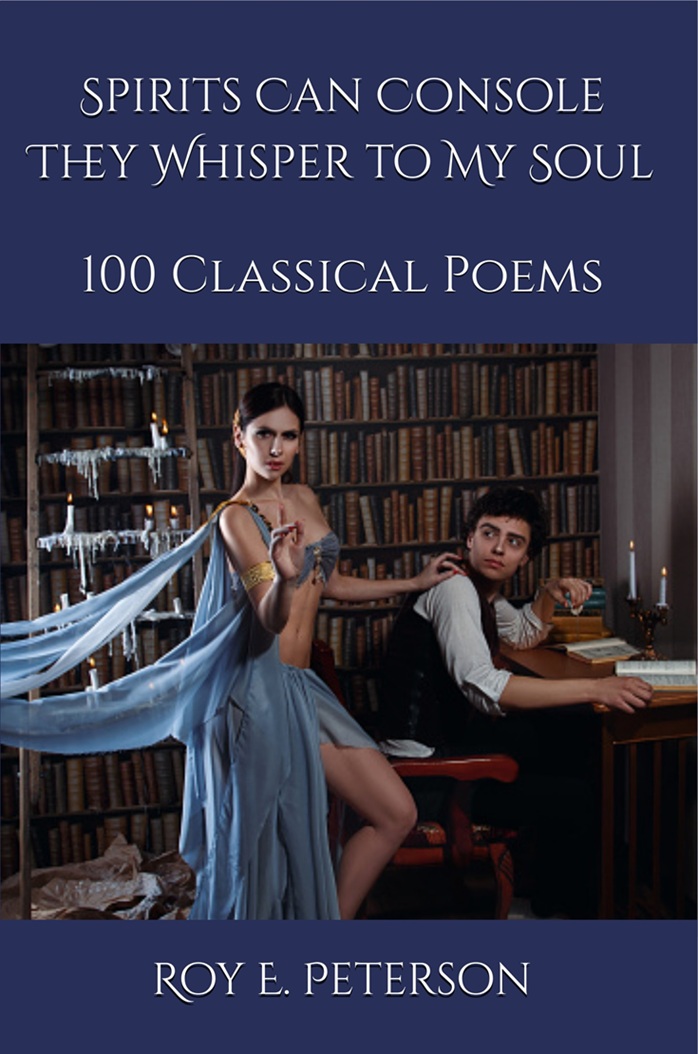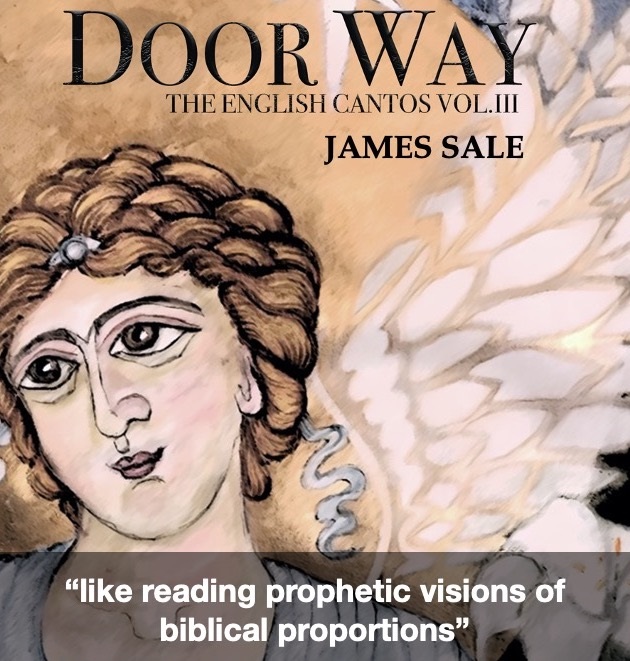.
Tapestry
My grandfather Evangelos did trading with the Turks
Of pipes and hookahs, hash, and cloths, and skillful carpet-works.
A tapestry he gave his wife in Main in nineteen-ten,
A secular non-Muslim piece, showed animals and men.
In foreground, street-scene, shops and people, harnessed camel clear,
A palm, a full-leaved cedar, and a wall of old Izmir.
The background, midnight blue with silhouettes of tower and kiosk,
And Eastern temple onion-domes that indicate a mosque.
Seeing on their great-room wall the woolen tapestry,
Caused visitors some doubts about their Christianity;
They’d each to one another their suspicions, whispered, tell:
“Kalliope and Evangelos have gone to infidel!”
But all admired its beauty and its power to impart
The great uplifting quality intrinsic to good art.
Kalliope gave it to their daughter, it went to her son,
Who gave it to his sister in the year two-thousand-one.
She treasures the connection to grandparents long since gone.
She looks on it, and dear Papou and Yiayia still live on.
In years, the tapestry will pass to those of blood-attendance:
Great-great-grandson Evangelos and on to his descendants.
.
Poet’s Note on Pronunciation:
Kalliope: kal-YOH-peh
Evangelos: ev-AN-ghe-los
Papou: pah-POO (grandfather)
Yiayia: YIA-ya (grandmother).
.
.
Mary Gardner is a poet living in Florida.

















Dear Mary —
aaaaaa… What I like most about your well-written poem is its sense of solidity and reality. Even though others may judge it by religious standards, you, as poet, take no sides, religious or other, except for the beauty of the object. I believe that a poem must be judged by poetic standards, which of course include aesthetics.
Its message? How a tapestry holds familial generations together.
Very nice, and appropriate to the time!
Thank you, Sally, for the kind words about the poem.
Mary, the tapestry is an antique treasure and now it has a poetic one to go with it. Elucidation of the origins, the scene and the family history make it come alive. I suspect “Main” is really “Maine.”
Lovely poem Mary. Very enjoyable to read. My favorite line is “The great uplifting quality intrinsic to good art.” You are fortunate that so many generations of your family apparently value this treasure. Some young people today show little interest in “old stuff.”
Thank you, Russel, for the sweet comments.
Thank you, Roy, for the uplifting comment.
Main is not Maine, but another spelling of the Mani area of Greece.
Loved the poem and the memories it evoked. It’s so beautifully composed.
Thank you, Rohini, for the kind words. I am happy that so many of you like it.
Such a great poem as are all the poems published on SCP of course but
I must say how pleased I am to see a poem from someone of Greek heritage using Greek words. As a yiayia myself I feel it is pretty special.
Is the illustration a picture of the actual tapestry? The mosque reminds me of the church of Ayia Sophia in Istanbul which is now a mosque and the woman on a camel of Mary and Joseph. I can see why Christian Greeks would be drawn to it.
I think it wonderful that your family have kept the names going. Evangelos is a beautiful name and I sometimes wonder if the Welsh name Evan derives from it because it would mean that there are links to how far the first Christian’s travelled to spread the gospel.
I really hope to read more of your poetry in the future.
Thank you, Mia, for the kind words. Yes, that is a picture of the actual tapestry. It hangs in our second bedroom, and visitors often comment on it.
“Evan” is just the Welsh form of the name John. In Russian, “Ivan” also is the form of John.
Yes, Evan is the Welsh form of John and that is why I was thinking of John the Evangelist which is where the Greek Christian name of Evangelos is derived from.
Because at first glance Evan is not at all similar in any shape or form to John. But it is the beginning of the word Evangelos.
But names do change so much from one language to the next.
Ivan could be from the Greek Ioannis and there is more of a similarity between Ivan and Evan.
PS
Just noticed that the woman walking behind the camel is walking with her hands crossed! Don’t you think that is unusual? No-one would walk like that with their hands in that position, would they?
The woman has her hands crossed because she is supporting a heavy load on her back. Her hands are holding the straps that are attached to that load.
“Evangelos” comes from the Greek word “euangellos,” which means “good messenger.” It’s not connected with the name John, which is of Hebrew origin.
Thank you I really appreciate your replies. I know that
I don’t have enough evidence to disagree with you. But I am not disagreeing, merely having a discussion. Evangelos, good messenger was coined because of the Christian message, hence evangelist and evangelical, and John the apostle was sometimes styled as John the Evangelist. I think he may have a feast day in the Greek Orthodox Church.
Again in the spirit of discussion, If the woman is merely supporting a load why do her hands need to be crossed. Would it not be easier to support the load with the right hand to her right shoulder and her left to her left?
You might think it strange that I should read things that are not there but I come from a background where during the Ottoman empire, christians used to gather at night to learn and worship. A long time ago and I thought I had moved on from the stories of my grandparents and great grandparents but just as I thought I was ready to leave my fears behind we are where we are today in terms of assault on freedoms.
Are we not meant to learn from history? If this is inappropriate here my sincere apologies as this is not my intention at all.
I’m not trying to argue or disagree, Mia. It just seems to me that the woman is carrying a heavy load on her back. I can’t come up with any special reason why her arms should be crossed.
No I did not think you were trying to argue or disagree
I was just worried that I was coming across as disagreeable!
Perhaps it is due to a lifetime of not going along with the consensus.
I really appreciate your comments, replies, essays and of course poems. Byron is one of my absolute favourites, not just because he loved Greece but because his poetry is genius.
I read this poem earlier today on my phone and loved it.
Thank you, Paul, for your nice comment about the poem.
About the figure of a woman with her arms crossed whilst walking behind the camel, do you think it is some kind of cryptic message. Was it safer not to be openly Christian and this was one way of somehow disguising the tapestry’s true meaning.
Mary, I really wish I could ask your Grandfather!
Mary, this is a lovely ekphrastic poem with the tapestry’s story woven into the family history – past, present and future. I like the way you capture the curiosities and suspicious whispers of those viewing it. But what I love most, is how those who have passed away live on in its very fabric. When I moved from England to Texas, I brought a painting of my grandparents with me. They watch me from my hall wall, and I feel their love and presence envelop me… just when I need it the most. Thank you!
Susan, thank you for your sweet post.
I have the tapestry